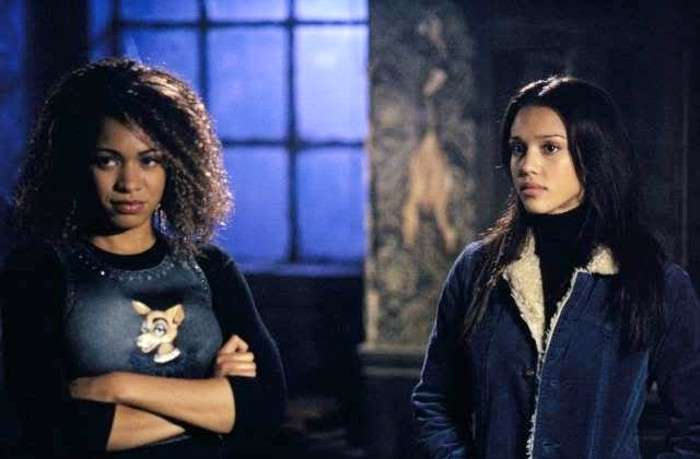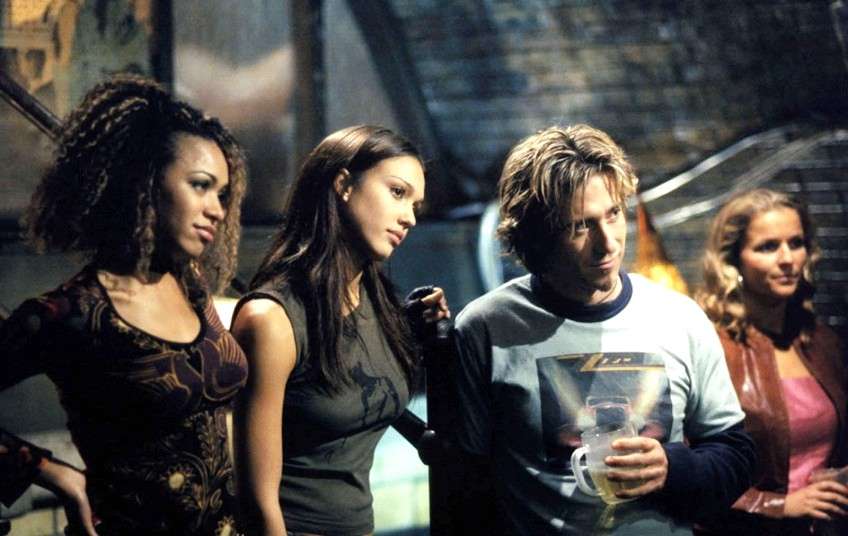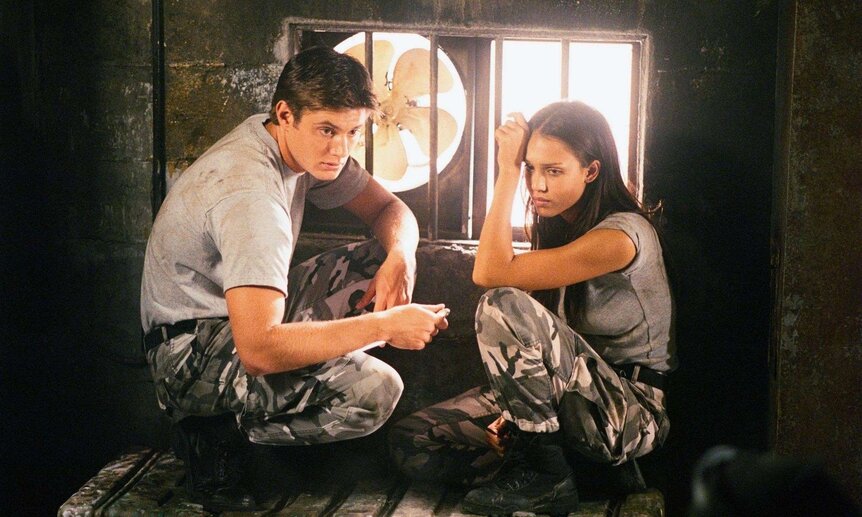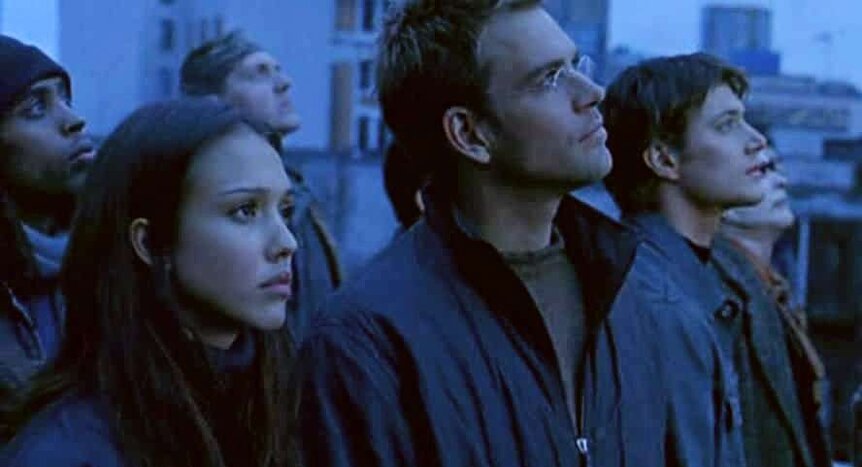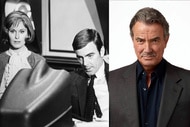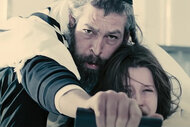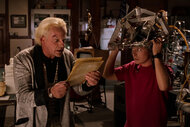Create a free profile to get unlimited access to exclusive videos, sweepstakes, and more!
Dark Angel's Valarie Rae Miller on the show's fight for queer representation
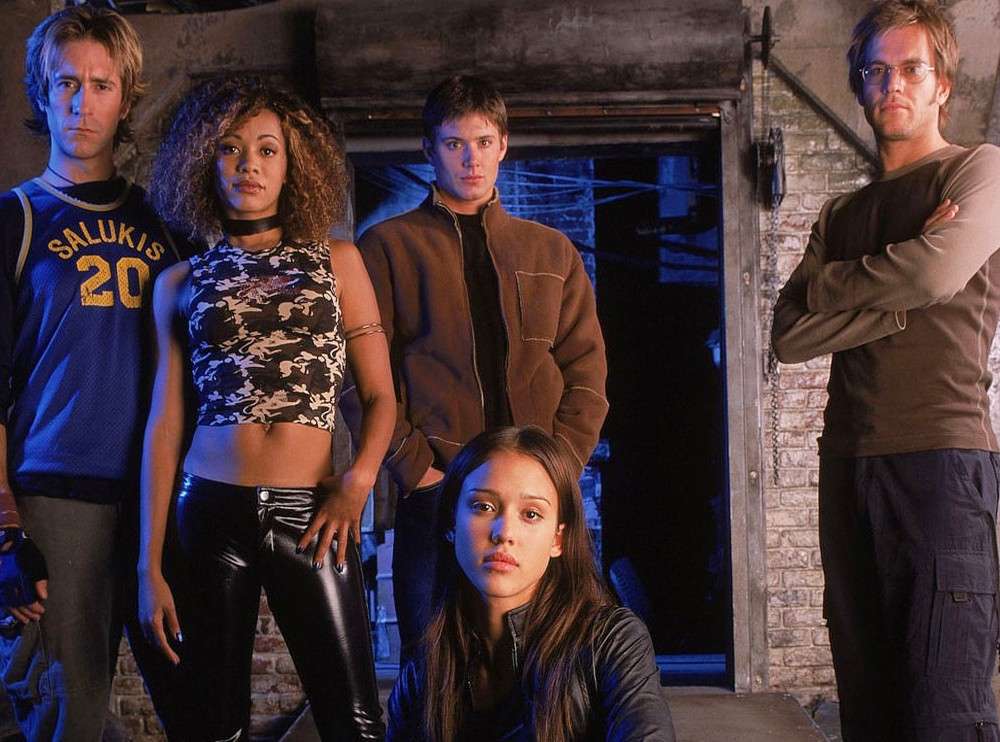
Dark Angel is the cyber-punk feminist sci-fi series that had no business being on network TV.
The brainchild of director James Cameron and producer Charles H. Eglee, the show premiered on Fox 20 years ago, and despite only running for two seasons, it made its mark on the early aughts television landscape. It predated other genre series – shows like Firefly and Lost and Battlestar Galactica – and it traded in the kind of empowerment and inclusion most of its fellow sci-fi series just weren't brave enough to try.
It featured a young Jessica Alba as its kickass lead, a genetically modified Manticore soldier named Max lying low from government goons in a post-apocalyptic Seattle. Terrorists had detonated an electromagnetic pulse years earlier, causing the future to revert back to archaic gadgets like pagers and landlines. In this imagined world, Max hid from the people who hunted her and her brothers and sisters, making deliveries as a bike messenger and moonlighting as a thief. It's how she'd eventually get caught up with a wealthy, righteous-as-all-hell journalist played by Michael Weatherly, who offered to reconnect her with her long lost family in exchange for her help busting corrupt politicians, dismantling systemic injustice, and fixing all of the other social issues the show seemed keen to explore.
But despite its inventive premise, its charismatic lead, and Cameron's endorsement, Dark Angel was canceled by the network under some confusing, unconventional circumstances.
SYFY FANGRRLS decided to celebrate the show's anniversary by talking to one of its stars, Valarie Rae Miller. She brought the fan-favorite Original Cindy to life on the show, breaking invisible barriers most series were happy to ignore at the time by playing one of the first queer women of color on primetime TV. Original Cindy was brash and blunt, a loyal friend, a complicated woman with her own struggles but her sexuality was never one of them. Years before The L Word and Skins, months before Willow and Tara would share a groundbreaking kiss on Buffy, Original Cindy was there, helping her girl Max stay out of trouble and fighting the futuristic man.
Miller gives us a behind-the-scenes look at Fox's most provocative sci-fi series, the fights creatives had behind the scenes, and the legacy of her character.
The Original Cindy
Cameron famously passed on Alba as Max during the first round of auditions, but the actress was able to convince him she could carry the series with another meeting. For Miller, she entered the project after another choice for the role fell through, and after she says the show decided to go in a different direction for its main lead.
Miller: You know that character was originally supposed to be Black, right? I wasn't allowed to audition for that part when it first came out because they were insistent that the character had to be exactly 18 years old, and I was over 18. I auditioned in front of two of the executive producers. Jessica's picture was on the wall. So they already knew, "We're hiring her." They said, "We may bring you back again for this other role." Since there was no script, I didn't know anything. I had to go in again and read and they didn't want me. The network didn't want me.
I knew the actress that they wanted for it. She's a nice girl, we were just completely different vibes. Networks typically wanted people that were safe. Or somebody that's so similar to somebody else that you've seen before. I wasn't that. I hear rumors about Jim [Cameron] saying that he's scary or whatever. I could not tell you how much I love this person. He's a dope individual. I had another deal with a talk show at the same time for Fox. The network made me pick between Dark Angel and this talk show. The talk show people were trying to puff up their chests and Jim actually told them that he wanted me for this job and that they would work around my schedule.
They had a hard time casting the role because nobody wanted to play a lesbian. A lot of people are really scared of it. And it was this whole thing. My part was originally supposed to have [gone] to Aaliyah. They had offered it to Aaliyah. I have no idea how many times they asked me if I'd have a problem kissing a girl. I was like, "I kissed all kinds of dudes I don't know or like, why is this any different?"
So, basically, I had to pick between Dark Angel and this talk show. And Jim stepped up and issued some sort of statement saying that they would work around me. I still had to make the decision. Of course, you are going to go with the one where they're going out of their way to try to work with you versus the people that are trying to bully you.
Building Character
The two-hour pilot of Dark Angel cost $10 million, a staggering number for network TV at the time, but a lot went into creating a darkly futuristic Seattle set in Vancouver, where the show filmed. It’s where the cast would bond, where storylines would be hammered out, and where Miller realized the show she had just signed onto was going to be different from anything else on television.
Miller: It, was one of the projects that I worked on, on TV, where, from the moment I read the first script, I was hooked. I would have watched the show regularly. You know what I mean? And for me, Jessica just reminded me of a little sister. They made us do something that they almost never do anymore, which is an actual chemistry test. That's how I got the job. That is why I was cast because after you saw Jessica and me together, there was no question. Jessica and I were probably the two closest [members of the cast]. She would try to make sure and look out for me, but you would want to take care of Jessica, that's how I felt about her. They worked that girl. She had no life outside of there.
For [my character] though, it was always a fight. I thought it was cool to have someone that was a lesbian at the time because they had never had a lesbian character on a primetime series that was a major character. And [the story] didn't make a big deal out of it. It just was. Even though it was handled that way initially, it was a big point of contention at the network and among producers. So, Charles Eglee, Chick was what everybody called him, was the one that fought for Original Cindy to be a lesbian. He basically declared war with Fox. Which ultimately became some of the undoing of the show.
Sometimes you pick your battles, but Chick just didn't give a f***. There were memos that came out weekly about the show. I definitely was the character that got the most notes from the network. Every week, it was something. She can't wear a crop top. She can't be this. And then there was one big famous meeting where the network asked Chick why Original Cindy had to be a lesbian. And Chick's answer? "She's a lesbian because she only eats p****." Word it how you have to word it, but that was the quote.
My character was in the crosshairs more than any character. On some level, I feel like Chick would actually antagonize a bit. My character spoke in slang a lot. Sometimes it was too much. I would just go through the script and scratch words out, because [he] was taking Urban Dictionary and just "drop, drop, drop." Nobody talks like that. I felt like sometimes, that was his way to lean in, to rebel.
We had fights about the lesbian [storyline] too. They brought in the girlfriend for Original Cindy, Diamond, [in] the Shorty’s In Love episode. I got to be present and read with the women they were considering. It's fascinating to watch their process, to see the logic, because they were doing this stereotype that they do — they wanted the girlfriend to be almost like a carbon copy of Original Cindy. I had problems with it, because you're saying that because she's a lesbian, everything about her identity comes from her girlfriend. It's like you get bit like a vampire. And then all of the sudden you become a vampire. Is that how it works?
That was one of the [fights] I lost.
Changing Narratives
In Season 2, Rene Echevarria replaced Charles Eglee as the main showrunner, a difficult switch for a sci-fi series as intricate and expansive as Dark Angel was becoming. Eglee remained on to assist with writing storylines and the show’s general direction, but there were marked differences in the direction of Season 2. New characters were brought on, including Jensen Ackles Alec and Kevin Durand’s hybrid dog-boy Joshua, and a new big bad — a breeding cult with government ties and an apocalyptic prophecy that centered around Alba’s Max — was introduced. It caused tensions behind the scene and confusion for Miller about her character’s purpose on the show.
Miller: So they replaced Chick as showrunner, with Rene Echevarria, and then there was another set of battles. Rene is now over the show, but Chick is still controlling my character's language, which was an odd thing. I'm not speaking a foreign language. A lot of his power came from the fact that nobody else could write all the slang, but there were a lot of weird things that happened.
A storyline came up in the second season where they wanted Cindy to hook up with Jensen's character, Alec. It was out of nowhere. Supposedly, Cindy all of the sudden looks at Jensen’s [character] and she keeps mentioning how pretty he is. The next thing you know, Cindy and Jensen's character hooked up. And I was like, "Hold on, this is sci-fi. You can't just be doing stuff like that." They're like, "What do you mean?" I was like, "She can't all of the sudden now be hooking up with a guy just because he's pretty. Something has to happen. Maybe her sexuality was unexplored, maybe she does like guys. OK, that's cool. But you need to explain because sci-fi people aren’t having it."
Rene, I think he might have even hung the phone up in my face because he was not having it. There was kind of a backlash. They were trying to push something different. It's like when you replace a captain and this other captain might not have been ready to be captain yet. And if they were, it might not have needed to be on this ship. As crazy as Chick might be, he was killing the storylines. We had some amazing writers on that show. I feel like the captain kind of changed the direction of the train.
That Cliffhanger Ending
The show's second season proved to be its last but not before Cameron would return to direct the oversized season finale. Cameron's first TV directing gig came because the creative wanted to prove to Fox that the show had potential and was worth a season three pickup. His explosive episode ended on a cliffhanger, as Max and her group of genetically modified freaks set up a new headquarters in a place called Terminal City and prepared to take on the police, the government, and a cult intent on wiping out Manticore subjects. Cameron’s bet seemed to have paid off… until it didn’t.
Miller: The show was picked up. We got a phone call during the week of Upfronts. I know because I had applied to graduate school and I got into a program at USC. I got the letter the day before I got the call saying we got picked up and so then I'm kind of like, "OK, what do I do?" I'm not going to not take the job. I said, "Don't say anything. Just wait it out." The producers called to say, "Just so you know, we're getting the pickup. They're making the announcement tomorrow." Then, a couple of days later, I got a follow-up call saying, "Sike." We were picked up, some behind the scenes drama ensued. And then we were not picked up. So guess who went to graduate school?
But it'd be nice to see some of those people again if [we did a reunion]. That was fun. That character was special. The concepts [were] really cool and just the storylines themselves, the way they tried to address a lot of things. They actually tried to address a lot of relevant stuff, still today. It kind of still relates to the way we view certain groups.
